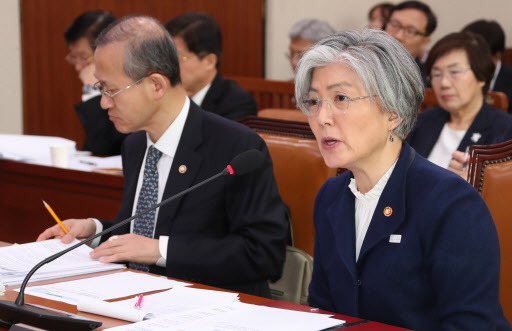Ministry admits to omitting part of US troop cost deal sent to Assembly
By Ock Hyun-juPublished : Feb. 21, 2018 - 18:37
The Ministry of Foreign Affairs on Wednesday admitted that a controversial part of the 2014 agreement to share costs for US troops stationed in South Korea was omitted from its report to the National Assembly.
The ministry’s task force conducted an internal review of the agreement, looking into allegations that the Park Geun-hye administration made a secret agreement with the US to contribute cash to building facilities for US troops stationed here.
The ministry’s task force conducted an internal review of the agreement, looking into allegations that the Park Geun-hye administration made a secret agreement with the US to contribute cash to building facilities for US troops stationed here.

The task force found that the clause, which allows South Korea to contribute extra cash to military construction for the 28,500 US military personnel here when necessary and when there is consent between the allies, was not included in the bill submitted to the parliament for ratification.
“There could be varying opinions, but the task force concluded that this provided grounds for suspecting a behind-the-scenes agreement,” a ministry official told reporters on condition of anonymity.
“It is clear that the arrangement for cash provision was drafted at the time (of the parliamentary reporting) but was not reported. As it was not fully reported to the Nationally Assembly, it could be suspected of a cover-up,” the official noted.
The additional arrangement was drafted when the bilateral agreement on military cost-sharing was presented to the parliament for ratification in February 2014. The agreement was approved in April and the additional arrangement was reported to the National Assembly afterward, which sparked speculations that the ministry had intentionally left it out to avoid scrutiny from lawmakers.
Since 1991, South Korea and the US have held talks to draw up a “special-measures” agreement on how the allies share the burden of defending the Korean Peninsula.
Under the ninth round of agreements, which was signed in February 2014 and expires at the end of 2018, the two countries agreed to pay 12 percent of all the defense contributions in cash and 88 percent in other forms. As an exception, the allies agreed that South Korea could provide extra cash for the US military construction costs here.
The move apparently came in consideration of the financing of a Sensitive Compartmented Information Facility, a US military facility for intelligence gathering, but cash payment has not yet been made to the US, according to the official.
He also said the disputed arrangement -- part of the details of implementing the agreement -- was not made public when the bill was presented to the parliament because Seoul and Washington’s defense ministries were still in consultation and it was not subject to parliamentary ratification.
The ministry, however, reserved its position on whether it had been intentionally omitted, triggering calls for a thorough probe into the 2014 agreement by an independent body.
“If it were to happen today, (the result) would be different, given the public expectations of transparency,” Foreign Minister Kang Kyung-wha said Wednesday during a meeting with lawmakers from the parliamentary committee on diplomacy and unification.
Kang said that the ministry would take “appropriate” measures to prevent a recurrence of such a cover-up and it will be well prepared for the upcoming defense cost-sharing talks with the US.
South Korea and the US plan to begin a new round of negotiations next month on how to shoulder defense costs for the US troops here amid US President Donald Trump‘s calls on South Korea to financially contribute more to the US defending its ally.
Defense Minister Song Young-moo said a day earlier that the US may demand that South Korea share additional costs for the deployment of the US Terminal High Altitude Area Defense anti-missile system in the South.
The Foreign Ministry began its preparations for the talks by appointing Chang Won-sam, a former ambassador to Sri Lanka, as the top negotiator in November last year.
(laeticia.ock@heraldcorp.com)
-
Articles by Ock Hyun-ju






![[From the Scene] Monks, Buddhists hail return of remains of Buddhas](http://res.heraldm.com/phpwas/restmb_idxmake.php?idx=644&simg=/content/image/2024/04/19/20240419050617_0.jpg&u=20240419175937)





![[Graphic News] French bulldog most popular breed in US, Maltese most popular in Korea](http://res.heraldm.com/phpwas/restmb_idxmake.php?idx=644&simg=/content/image/2024/04/18/20240418050864_0.gif&u=)



![[From the Scene] Monks, Buddhists hail return of remains of Buddhas](http://res.heraldm.com/phpwas/restmb_idxmake.php?idx=652&simg=/content/image/2024/04/19/20240419050617_0.jpg&u=20240419175937)

![[KH Explains] Hyundai's full hybrid edge to pay off amid slow transition to pure EVs](http://res.heraldm.com/phpwas/restmb_idxmake.php?idx=652&simg=/content/image/2024/04/18/20240418050645_0.jpg&u=20240419100350)

![[Today’s K-pop] Illit drops debut single remix](http://res.heraldm.com/phpwas/restmb_idxmake.php?idx=642&simg=/content/image/2024/04/19/20240419050612_0.jpg&u=)